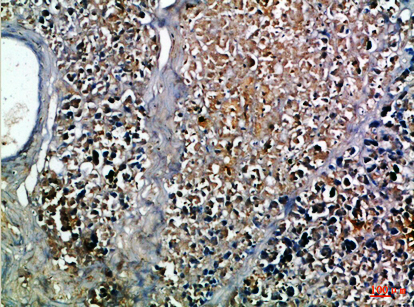
| WB | 咨询技术 | Human,Mouse,Rat |
| IF | 咨询技术 | Human,Mouse,Rat |
| IHC | 1/50-1/100 | Human,Mouse,Rat |
| ICC | 技术咨询 | Human,Mouse,Rat |
| FCM | 咨询技术 | Human,Mouse,Rat |
| Elisa | 1/10000 | Human,Mouse,Rat |
| Aliases | Insulin [Cleaved into: Insulin B chain; Insulin A chain] |
| Entrez GeneID | 3630 |
| Host/Isotype | Rabbit IgG |
| Antibody Type | Primary antibody |
| Storage | Store at 4°C short term. Aliquot and store at -20°C long term. Avoid freeze/thaw cycles. |
| Species Reactivity | Human,Mouse,Rat |
| Immunogen | Synthetic peptide from human protein at AA range: 30-70 |
| Formulation | Purified antibody in PBS with 0.05% sodium azide,0.5%BSA and 50% glycerol. |
+ +
以下是关于胰岛素抗体的3篇参考文献,包括文献名称、作者及简要摘要内容:
---
1. **"Antibodies to Insulin in Diabetic Children Treated with Porcine and Bovine Insulin"**
*作者:Ludvigsson J, Heding LG (1983)*
摘要:研究比较了使用猪胰岛素和牛胰岛素的糖尿病儿童患者体内抗体生成情况,发现牛胰岛素引发的抗体反应更显著,可能导致血糖控制不稳定。建议优先选择免疫原性较低的胰岛素类型。
2. **"Human Insulin: Reduced Antibody Formation in Type 1 Diabetes"**
*作者:Home PD, Alberti KGMM (1989)*
摘要:通过临床试验发现,与动物源性胰岛素相比,重组人胰岛素显著降低了1型糖尿病患者体内抗体的产生,并改善了血糖控制的稳定性,支持人胰岛素在临床中的广泛应用。
3. **"Insulin Autoimmune Syndrome: A Systematic Review of Case Reports"**
*作者:Uchigata Y, Eguchi Y, Takayama-Hasumi S (1993)*
摘要:分析胰岛素自身免疫综合征(IAS)的发病机制,发现患者体内存在高滴度的抗胰岛素自身抗体,导致自发性低血糖。研究指出该病与特定HLA基因型及药物(如甲巯咪唑)使用相关。
---
以上文献涵盖了胰岛素抗体的临床影响(治疗选择与免疫原性)、自身免疫综合征机制等内容,均为该领域的经典或关键研究。
Insulin antibodies are immune molecules produced by the immune system that specifically target insulin, a hormone critical for glucose regulation. First identified in the 1950s, these antibodies gained attention in the context of diabetes management. In type 1 diabetes, autoantibodies against insulin (IAA) are among the earliest markers of autoimmune beta-cell destruction, often appearing before clinical symptoms. They form part of the diagnostic criteria for type 1 diabetes alongside other islet cell antibodies.
Exogenously administered insulin in diabetes therapy can also trigger antibody development. While modern recombinant human insulin analogs exhibit lower immunogenicity, some patients still develop neutralizing antibodies that may reduce insulin efficacy, alter pharmacokinetics, or rarely cause insulin resistance. Historically, animal-derived insulin preparations had higher rates of antibody induction.
In diagnostic settings, insulin antibodies are measured to investigate unexplained hypoglycemia (e.g., insulin autoimmune syndrome) or suspected factitious insulin administration. Research continues to explore their role in diabetes pathogenesis, heterogeneity in immune responses, and potential clinical implications for personalized treatment strategies. Current assays differentiate between endogenous and therapeutic insulin-binding antibodies, aiding in precise clinical interpretation.
×